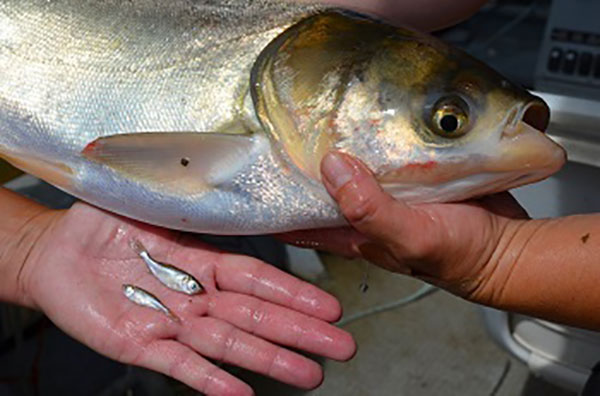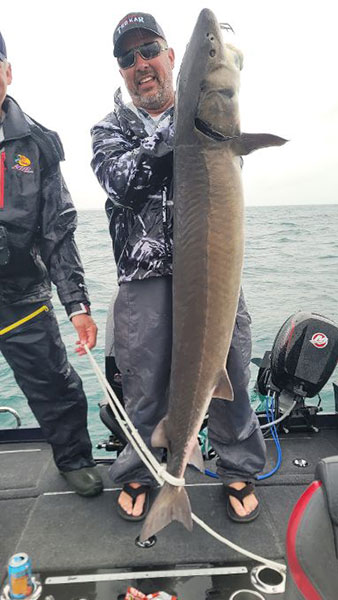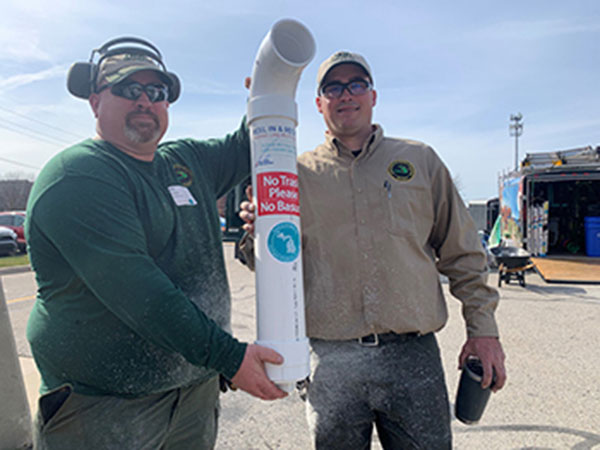- Details
MDNR Report
 Invasiv Bighead Carp
Invasiv Bighead Carp
Routine environmental DNA (eDNA) surveillance for invasive bighead and silver carp, conducted annually by the U.S. Fish and Wildlife Service, turned up a single positive sample in the St. Joseph River near the St. Joseph/Benton Harbor area, according to data provided to the Michigan Department of Natural Resources on Aug. 28.
Of 220 water samples collected in June 2023 from stretches of the river between Lake Michigan and Berrien Springs, only one, taken near Marina Island, showed evidence of genetic material from silver carp.
“A positive eDNA sample does not necessarily indicate the presence of live fish,” said Seth Herbst, DNR Fisheries Research Program manager. “It is possible for genetic material to be introduced from other sources, such as boats or fishing equipment used in another state where invasive carp are present, then transported and used in Michigan waters.”
The Marina Island area is home to multiple marinas and a city boat launch with high recreational use by locals and visitors accessing the St. Joseph River and Lake Michigan. The positive detection occurred directly in front of a marina, suggesting boater traffic may have contributed to the detection.
- Details
By Louie Stout
 Scott Solomon with big sturgeon
Scott Solomon with big sturgeon
Scott Solomon not only won the junk fish pot in a tournament on St. Clair, but he blew it away.
Solomon was fishing a 2.75-inch tube on a 3/8-ounce jighead when a giant sturgeon clamped on during the Dearborn Firefighters fundraiser tournament.
And he landed the 60-inch, 75-pound monster that fish biologists estimate to be more than 25 years old.
It took him 30 minutes and he had the fish to the boat five times before he, Chad and George Lovell finally wrestled it into the boat.
And yes, it was hooked in the mouth. He caught the fish on 40-pound PowerPro braid and an American Angler spinning rod and Team Lew’s spinning reel.
“That reel took a pounding,” said Solomon, who lives in Edwardsburg, Mich. “We released the fish and provided the photo as proof to the tournament officials.”
The team finished fifth overall in the tournament.
- Details
MDNR Report
 Fishing line recycling tube
Fishing line recycling tube
Thanks to the kindness of thousands of campers and boaters who gave an additional $2 when making their camping or boating reservation, the DNR is rolling out fishing line recycling tubes this summer and fall (with many in southern Michigan already in place).
With the help of Michigan Cares for Tourism volunteers who are building the tubes, the DNR is working to place them at every harbor, boating access site and fishing pier throughout the state's parks and recreation system. These recycling tubes will help protect aquatic wildlife from the dangers of eating or getting tangled in fishing line and other fishing tackle. It also helps protect boat propellers. Find other new sustainable boating efforts and BoatUS Foundation's video on why to recycle fish line.
- Details
MDNR Report
Fall turkey hunting license applications for the 2023 season are available now through Aug. 1.
You can buy an application for $5 online at eLicense, anywhere DNR licenses are sold, or through the Michigan DNR Hunt Fish app. When applying, enter your email or phone number to be automatically alerted of drawing results Aug. 14.
- Details
MDNR Report
Lake frontage, river frontage and vacant forested acreage surrounded by private ownership are just some of the 95 parcels available in the next round of surplus land auctions from the Michigan Department of Natural Resources. Surplus land sales are a regular part of the DNR’s strategy to manage 4.6 million acres of public land owned by the people of Michigan.
Land is available in a dozen counties throughout the Lower and Upper peninsulas: Alger, Allegan, Chippewa, Dickinson, Iosco, Lake, Kent, Mackinac, Midland, Montcalm, Oscoda and Presque Isle. Several of the largest parcels are in Alger, Chippewa, Dickinson, Iosco, Midland, Oscoda and Presque Isle counties, while lakefront and riverfront parcels are in Allegan, Chippewa, Iosco, Lake, Montcalm and Presque Isle counties.
Nine online auctions will feature available land parcels by county:
- Aug. 4 – Lake County.
- Aug. 10 – Montcalm County.
- Aug. 15 – Alger, Chippewa and Mackinac counties.
- Aug. 16 – Dickinson County.
- Aug. 22 – Oscoda County.
- Aug. 23 – Presque Isle County.
- Aug. 29 – Allegan and Kent counties.
- Sept. 6 – Midland County.
- Sept. 7 – Iosco County.
“Offering state-managed public lands at auction is the final step of a lengthy, ongoing land review process, built on a conservation framework, that ensures these lands’ best use for the benefit of Michigan residents, visitors and natural resources,” said Scott Whitcomb, acting DNR deputy director.
“Many of the sale parcels are forested or have road frontage, but are better suited for private ownership for a number of reasons,” Whitcomb said. “Much of the land is isolated from other DNR- managed property, and that can create management challenges. Other parcels are included for auction because they offer limited public opportunities for quality outdoor recreation experiences.”
How bidding works
Interested bidders may pre-register and get more information about the online auction schedule at www.tax-sale.info. All bidders must register before a property’s auction date. Absentee bids can be made up to 30 days before the auction.
The “interactive” bidding portion of an auction will open at 10 a.m. on that auction date. At that time, bidders will be able to see current high bids for each property. Bidders can continue to place bids on a property until 7 p.m. that day, when bidding closes and the winning bidder is determined.
A detailed list including minimum bid, acreage, maps and location information of offered properties can be found at Michigan.gov/LandforSale. Interested bidders are encouraged to review the


